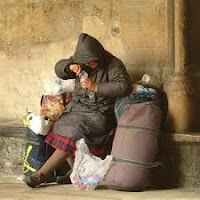Homelessness
1. What issue does Dave discover?
He discovers homelessness and how it can be hard to break out of it.
2. How do people become homeless?
· Mental Illness: Suffer from depression, schizophrenia, bipolar etc causing them to be unable to keep a job down or pay for their medication so they are cast out onto the streets.
· Domestic Violence: May cause women to flee from their homes in a rush without money or any items.
· Lost their jobs: Many middle class people lose their jobs (the recession), lose their homes and so become homeless.
· Addictions: Many have drug and alcohol problems and become homeless because they have spent all their money on these items.
· Gambling: They spend all their money
3. What are their lives like?
· They are ‘rough sleepers’ meaning they have no beds
· They may be hopeless, trapped and desperate.
· Can experience violence (if they steal a sleeping spot) and sometimes rape (women).
· Many have no place to sleep and can have alcohol or substance abuse and so are not offered beds by organisations.
· Some will ride trains so that they have somewhere to sleep
· A lot of homeless people smoke to quench hunger.
4. Who is helping these people?
· Salvation army
· Mission Beat
· St Vincent De Paul’s
5. How does Dave’s experience ‘shed light’ or raise awareness to the issue?
Dave raises awareness and educates people on how the homeless live and what they experience. He shows the real back story of why poverty occurs and what it actually is. He provides insightful comments and makes people really feel sympathy for the plight of homeless people.















